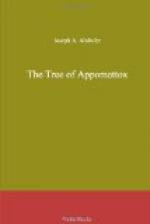He extended his hand and Dick’s met it in a warm grasp. Langdon also shook hands with him, and as his eyes twinkled he said:
“Don’t fail to notice my haughty bearing when I march at the head of a triumphal troop down Broadway!”
“I promise,” said Dick. Then he and Harry gave each other the final clasp. But with the pride of the young they strove not to show emotion.
“Take care of yourself, Dick, old man!” said Harry. “Don’t get in the way of bullets and shell. Remember they’re harder than you are.”
“The same to you, Harry. It’s not worth while to take any more risks than necessary.”
Then, obeying the call of the trumpets, they mounted and rode to their own commands. There was something strange in this brief half hour of friendship, when they buried the dead together. Blue and gray formed again in long lines facing one another, but midway between was another long line of fresh earth, and it rose up suddenly, an impassable barrier to a charge by either force.
“We can’t beat them and they can’t beat us. That’s been proved,” said Colonel Hertford to Colonel Winchester and Colonel Bedford.
“So it has,” said Colonel Winchester, “and I’d like to march from here. I don’t care for any more fighting on this spot.”
“Nor I. Hark, they’ve decided it for us!”
The Southern trumpet sounded another call, and the line of men in gray, turning away, began to march into the southwest. Colonel Hertford promptly gave an order, the Union trumpet sounded also, and the men in blue, curving also, rode toward the northwest.
Dick and his comrades were silent a long time. Their feelings were perhaps the same. To youth a year is a long time, and two years are almost a life time. Three years and more of it had made war to them a normal state. They had not thought much before of an end to the great struggle between North and South, and of what was to come after. Now they realized that peace, not war, was normal, and that it must return.
The moonlight faded and then the stars were dimmed, as the darkness that precedes the dawn came. The silvery veil that had been thrown over them vanished and the column became a ghostly train riding in the dusk. But the road into which Shepard guided them led over a pleasant land of hills and clear streams. Although the scouts on their flanks kept vigilant watch, many of the men slept soundly in their saddles. Dick himself dozed awhile, and slept awhile, and, when he roused himself from his last nap, the dawn was breaking over the brown hills and the column was halting for food and a little rest.
It was August, the time of great heat in Virginia, but they were already building fires to cook the breakfast and make coffee, and most of the men had dismounted. Dick sprang down also and turned his horse loose to graze with the others. Then he joined Warner and Pennington and fell hungrily to work. When he thought of it afterward he could scarcely remember a time in the whole war when he was not hungry.




